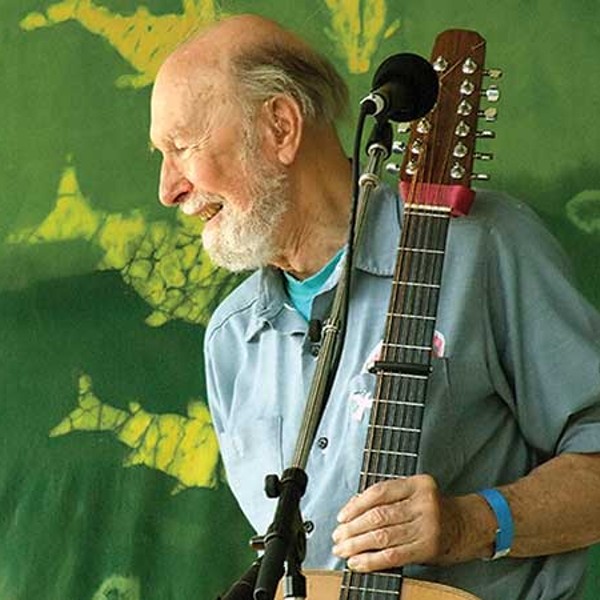Through his father Seeger next got a job working for Library of Congress music archivist Alan Lomax, with whom he cataloged thousands of folk and blues records and traveled the Deep South making field recordings. His further immersion in the music's raw, plainspoken honesty redoubled his already evangelical commitment to it, and he began to perform many of the tunes he came across. Seeger became their vessel, and were it not for him much of America's rich music might, at best, lay a-moldering in the National Archives instead of soaring from the throats of the people. During this time he met and sang with luminaries like Leadbelly (another musical vessel), Josh White, and Aunt Molly Jackson, among others. But the big bang of the American folk renaissance came in 1940 at a migrant workers benefit, when he met a 28-year-old songster from Oklahoma: Woody Guthrie. The cocky Dust Bowl troubadour had an immediate and profound influence on Seeger, and the pair became tight friends, hopping trains and getting to know the heartland firsthand.
Seeger eventually landed in New York, where he co-founded the Almanac Singers, a string-band collective that soon also featured Guthrie. The group specialized in topical and socially progressive songs and frequently performed at union rallies and leftist events. The pacifist Almanacs changed their antiwar tune after Germany turned on Russia and Pearl Harbor was attacked, but disintegrated as the members grew apart and the group drew criticism for its past stance. Seeger did serve, and was stationed in the South Pacific, where he played for other troops. He married Toshi, "without whom the world would not turn nor the sun shine," in 1943.
After the war Seeger and his fellow ex-Almanac Lee Hays formed the Weavers, who became wildly popular via hit readings of folk standards like "Kisses Sweeter Than Wine" and Leadbelly's "Goodnight Irene." But during the Red Scare of the 1950s the radical pasts of its members landed the group on the government blacklist, which saw them shut out of gigs and record sales. Seeger, who'd long since left the Communist Party, was summoned to stand before the notorious House Un-American Activities Committee (HUAC). When grilled about whether or not he'd performed at Party benefits he refused to answer or plead the Fifth Amendment, asserting that anything he'd done in that vein was protected by the right to free speech. He was convicted for contempt of Congress, a 10-year sentence eventually overturned in 1962, but used the growing backlash against red-baiting to his advantage by performing at colleges, creating the modern touring circuit and becoming the patriarch of the next wave of folk music.
One of the strongest voices of the civil rights movement, Seeger marched and sang freedom songs with Martin Luther King and played countless concerts for the cause. In that decade and into the next he railed against the Vietnam War, performing at peace rallies and even sheltering the odd draft dodger. One of these runaways was musician Victorio Roland Mousaa, who is currently organizing a New York concert for March starring Seeger, Joan Baez, Richie Havens, and others to aid Native American activist Leonard Peltier, who has been imprisoned since 1977 on highly contested murder charges.
Seeger learned to sail while working a job on Cape Cod, and in the mid 1960s bought a small boat that he'd take out on the Hudson. What he saw there—miles of toxic residue, oil pollution, raw sewage—was heartbreaking for the lifelong outdoorsman. "I thought of [economist] John Kenneth Galbraith's great phrase, 'private affluence, public squalor,'" he recalls. "I had enough money to buy this boat, but I was sailing through shit." Resolved to do something about the deplorable state of the once proud, life-giving artery, he co-founded the Clearwater Foundation in 1969 and helped build the sailing sloop and environmental-awareness classroom Clearwater. Over 40 years later, the organization, which the singer calls his greatest achievement, has inspired dozens of kindred efforts worldwide and continues to keep the river clean via fundraising events culminating with June's annual Great Hudson River Revival.

















